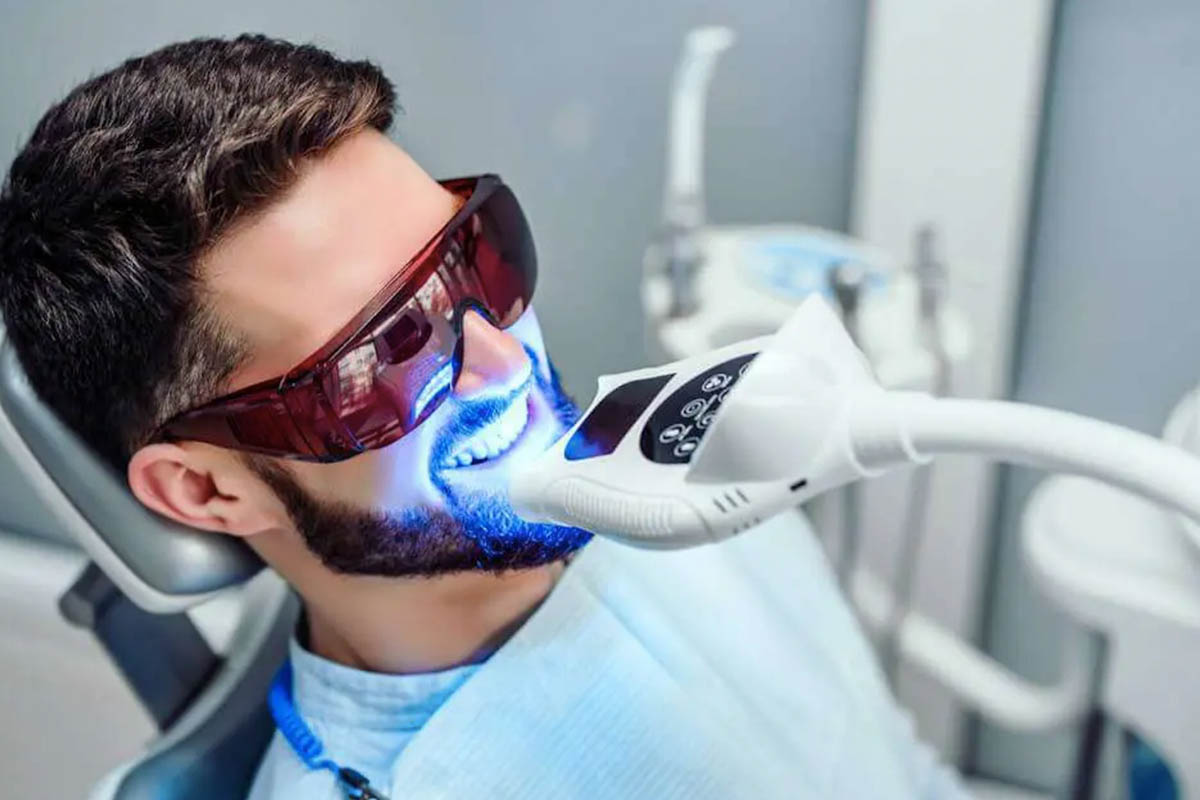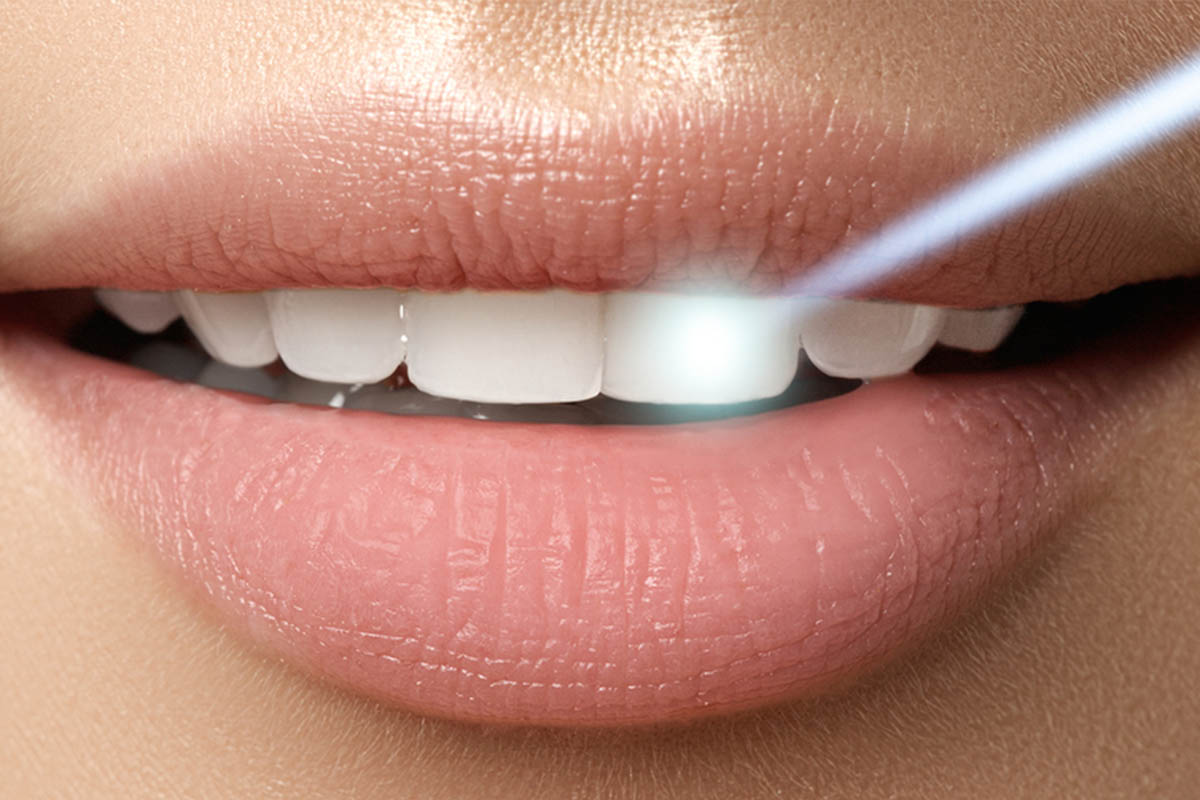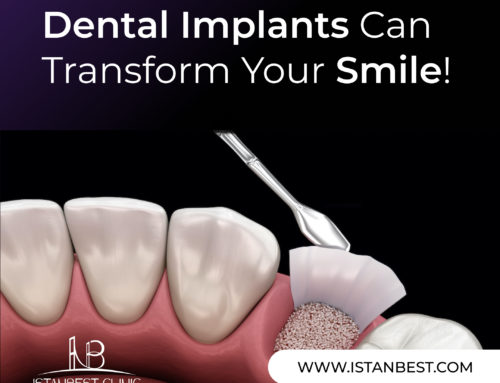Laser teeth whitening is a bleaching technique conducted within a dental clinic, distinguishing itself from alternative teeth whitening approaches by utilizing a combination of bleaching gel and laser technology. The laser, in this context, constitutes a concentrated beam of high-intensity light. This discussion delves into the steps involved, potential side effects, associated expenses, and the duration of the whitening outcomes.

Laser Teeth Whitening
Laser teeth whitening, also referred to as laser teeth bleaching, is a method crafted to enhance the brightness of your teeth. In this process, a bleaching gel is applied to the teeth, followed by the precise application of a laser that heats up the gel. This activation triggers the whitening properties, modifying stain molecules on the teeth.
The primary objective of laser teeth whitening is to diminish discoloration, resulting in a visibly whiter appearance of the teeth.
Tooth discoloration can occur due to various factors, such as the consumption of certain foods and beverages like coffee and tea, tobacco use, aging, mouth injuries, and the intake of specific medications like antihistamines and chemotherapy.
A 2015 literature review suggests that the outcomes of laser teeth whitening are comparable to other in-office whitening methods utilizing UV light or whitening gels. However, it’s important to note that the Food and Drug Administration (FDA) regards laser use in dentistry for teeth whitening as an “off-label” application, and consequently, the American Dental Association does not endorse the use of lasers in this context.
How does laser teeth whitening function?
Laser teeth whitening is exclusively carried out in a dental office, and the bleaching process typically spans 30 to 60 minutes.
The specific steps may vary depending on individual needs, but a standard treatment generally involves the following:
- Your dentist will insert a rubber or plastic device into your mouth to maintain it open.
- Protective glasses will be provided to shield your eyes during the procedure.
- A gum barrier, often composed of a light-cured resin material, is applied to safeguard your gums.
- The dentist then applies a bleaching gel to the front teeth.
- After a brief interval, a laser is directed onto your teeth.
- The laser warms the bleaching gel, activating its whitening properties.
- The gum barrier is removed, and the bleaching gel is rinsed away.
Despite anecdotal evidence suggesting that laser teeth whitening is typically painless, there may be increased tooth sensitivity for approximately 24 hours post-procedure.
It’s crucial to note that excessive teeth bleaching could potentially harm tooth enamel or pulp, the innermost layer of the tooth containing blood vessels and nerves. To safeguard your teeth, it’s advisable to avoid frequent whitening. A skilled dentist can guide you on the optimal frequency for your individual needs and execute the procedure in a manner that ensures the protection of your teeth and gums.
What is the duration of the effects?
Laser teeth whitening proves to be effective in diminishing teeth discoloration.
This procedure typically employs more potent chemicals compared to those found in at-home whitening treatments. Consequently, laser teeth whitening is more efficacious and delivers quicker results than home-based options such as daily whitening strips or whitening toothpaste.
The whitening outcomes are temporary and can persist for a span ranging from a few months to up to 3 years. This duration surpasses that of many other treatments, including whitening strips and toothpaste.
The longevity of your results hinges on various factors, including:
- The original color of your teeth
- The frequency of the treatments
- Your lifestyle habits
- The specific bleaching gel and lasers utilized
For optimal results, it is advisable to undergo three or four sessions in total.
Additionally, making adjustments to certain habits can contribute to maintaining the achieved results:
- Limiting or abstaining from tobacco use, including cigarettes
- Restricting or avoiding consumption of foods and drinks known to stain teeth, such as coffee or red wine
- Minimizing the risk of mouth trauma, which can elevate the likelihood of stains.

What are the potential risks?
Laser teeth whitening is not devoid of risks, and potential side effects encompass:
- Heightened tooth sensitivity
- Irritation or damage to the gums
- Potential harm to tooth pulp or mouth tissues
- Loss of fluoride and minerals in the teeth
- Increased susceptibility to tooth erosion or decay
Additionally, the procedure may not be suitable if you:
- Are currently undergoing orthodontic treatment
- Possess tetracycline stains on your teeth
- Have an orofacial tumor, tooth malformation, or mouth injury
- Are taking analgesic, anti-inflammatory, or antibiotic medications
- Have exposed dentin or weakened enamel
It’s crucial to note that laser teeth bleaching is ineffective on dentures or crowns. If you have either of these dental devices on your front teeth, the procedure may not be suitable for you.
In summary, Laser teeth whitening, a cosmetic dental procedure offered at IstanBest Clinic, utilizes bleaching gel and lasers to effectively diminish teeth discoloration, resulting in a visibly brighter and whiter smile.
In comparison to at-home solutions like whitening strips, laser teeth bleaching at IstanBest Clinic proves to be more potent. However, it is essential to note that this procedure comes with a higher cost and is typically not covered by dental insurance.
While the treatment can deliver impactful results, it’s important to be aware of potential side effects such as heightened tooth sensitivity, erosion, and decay. To determine the appropriateness of laser teeth whitening at IstanBest Clinic for your individual needs, it is recommended to consult with a dentist.




